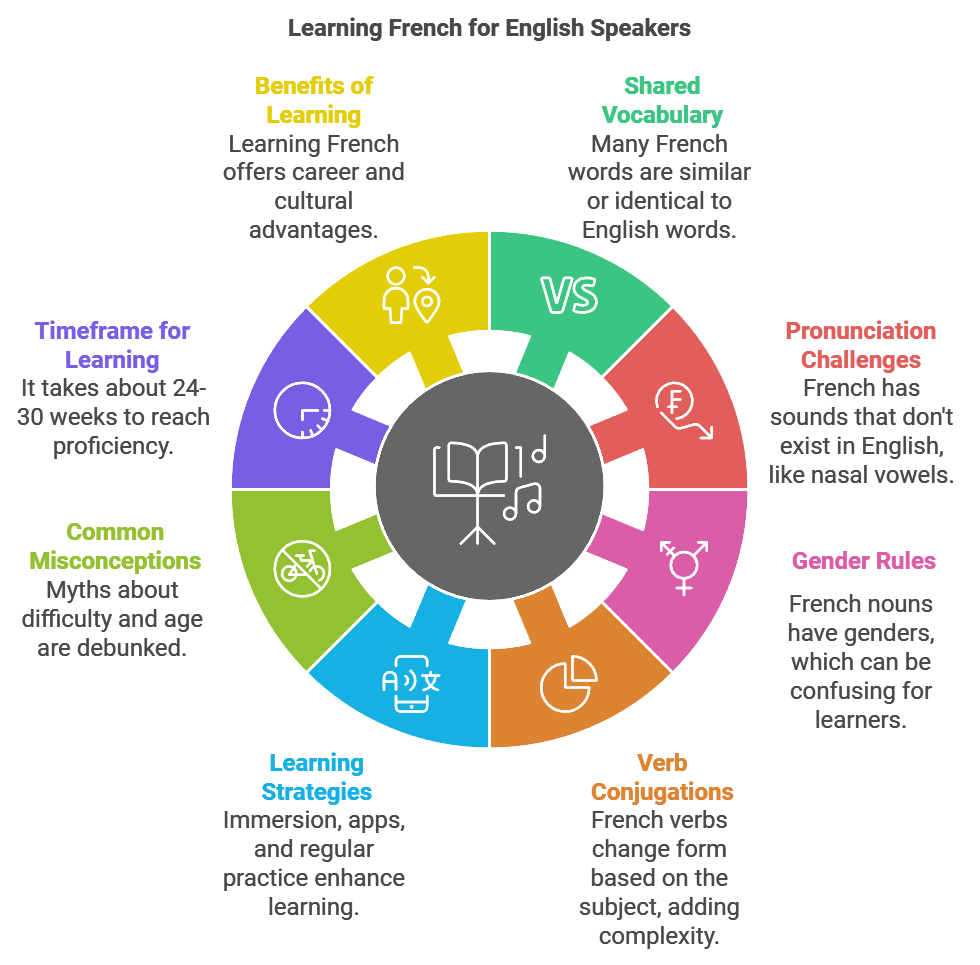Is French Hard to Learn for English Speakers?
French is not as hard to learn for English speakers as you might think. In fact, it’s one of the easier languages for English speakers to pick up. The Foreign Service Institute ranks French as a Category I language, meaning it’s among the easiest for English speakers to learn. That said, like any new skill, learning French does come with its challenges. But don’t worry – with the right approach and mindset, you can definitely master it!
Key Takeaways:
- French is relatively easy for English speakers to learn
- Shared vocabulary and similar grammar make it easier
- Pronunciation and gender rules can be tricky at first
- Age doesn’t matter – anyone can learn French
- Consistent practice and immersion are key to success
Similarities Between French and English
Did you know that French and English have a lot in common? This makes learning French much easier for English speakers. Let’s look at some of these similarities:
Shared Vocabulary
Many French words are similar or identical to English words. These are called cognates. For example:
| French Word | English Word |
|---|---|
| Liberté | Liberty |
| Égalité | Equality |
| Fraternité | Fraternity |
Learning these cognates can quickly boost your French vocabulary!
Similar Alphabet
French uses the same alphabet as English, with a few extra accents. This means you don’t have to learn a whole new writing system like you would for languages like Chinese or Arabic.
Comparable Sentence Structures
French and English often use similar sentence structures. For instance, both languages usually follow a subject-verb-object order. This makes it easier to form sentences in French.
Challenges for English Speakers
While French has many similarities to English, there are some aspects that can be tricky:
Pronunciation
French has some sounds that don’t exist in English. The nasal vowels and the French “r” can be challenging at first. But don’t worry – with practice, you’ll get the hang of it!
Gender Rules
In French, all nouns have a gender – they’re either masculine or feminine. This can be confusing for English speakers, as we don’t have this in our language. For example:
- La table (feminine) = The table
- Le livre (masculine) = The book
Verb Conjugations
French verbs change their form depending on who’s doing the action. This is called conjugation. While English has some conjugation, French has more complex rules.

Advantages for English Speakers
Despite these challenges, English speakers have several advantages when learning French:
- Familiar Vocabulary: Many French words have English counterparts, making them easier to remember.
- Similar Grammar Concepts: While some grammar rules differ, many are similar to English.
- Cultural Familiarity: English and French cultures have influenced each other for centuries, making cultural understanding easier.
Learning Strategies
Want to make learning French easier? Try these strategies:
Immersion Techniques
Surround yourself with French as much as possible. Watch French movies, listen to French music, or even change your phone’s language to French. This helps you learn naturally.
Language Learning Apps
Use apps like Duolingo, Babbel, or Rosetta Stone. These make learning fun and interactive. Plus, you can practice anytime, anywhere!
Regular Practice
Consistency is key. Even 15 minutes a day can make a big difference. Can you find 15 minutes in your day for French?
Common Misconceptions
Let’s bust some myths about learning French:
- “French is too difficult”: As we’ve seen, French is actually one of the easier languages for English speakers to learn.
- “You need to be young to learn effectively”: Not true! Adults can learn languages just as well as children. It’s never too late to start.
- “You must live in a French-speaking country”: While immersion helps, you can learn French from anywhere with the right resources and dedication.
Resources for Learning French
There are many great resources to help you learn French:
- Online courses (like Coursera or edX)
- Language exchange programs (try apps like Tandem or HelloTalk)
- French media (movies, TV shows, podcasts, books)
Timeframe for Learning French
How long does it take to learn French? Well, it depends on a few things:
- Your dedication and practice time
- Your learning method
- Your natural language aptitude
On average, it takes about 24-30 weeks (600-750 class hours) to reach professional working proficiency in French. But remember, everyone learns at their own pace. The key is to enjoy the journey!
Benefits of Learning French
Learning French opens up a world of opportunities:
- Career advancement in international business, diplomacy, or tourism
- Deeper appreciation of French art, literature, and culture
- Improved cognitive skills and memory
- Easier learning of other Romance languages like Spanish or Italian
Conclusion
So, is French hard to learn for English speakers? Not really! While it has its challenges, French is one of the easier languages for English speakers to learn. With its similarities to English, rich cultural connections, and the abundance of learning resources available, French is an accessible and rewarding language to study.
Remember, the key to success is consistency and enjoyment. Find learning methods that work for you, immerse yourself in the language as much as possible, and don’t be afraid to make mistakes. Every error is a chance to learn!
Are you ready to start your French learning journey? Allez-y! (Go for it!)
